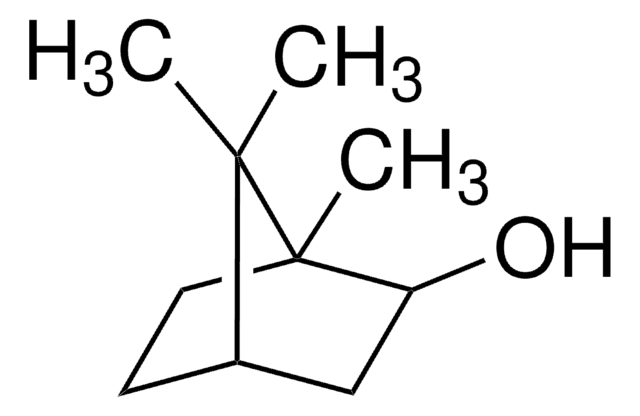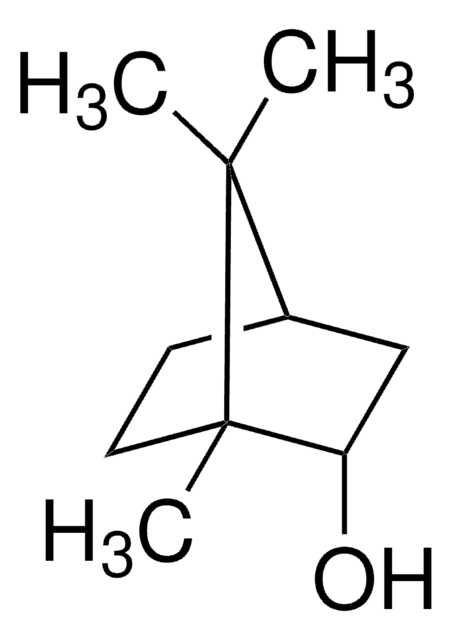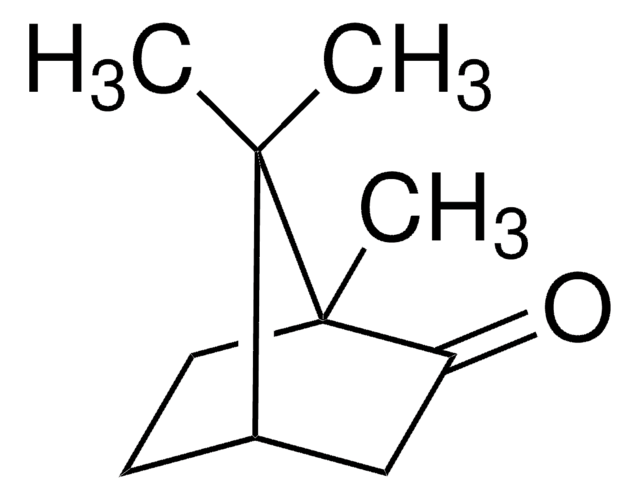148075
Camphor
96%
Synonym(s):
(±)-Camphor, 1,7,7-Trimethylbicyclo[2.2.1]heptan-2-one
About This Item
Recommended Products
vapor density
5.2 (vs air)
Quality Level
vapor pressure
4 mmHg ( 70 °C)
Assay
96%
autoignition temp.
870 °F
expl. lim.
3.5 %
bp
204 °C (lit.)
mp
175-177 °C (lit.)
solubility
ethanol: soluble 1 g/L, clear, colorless
functional group
ketone
SMILES string
[H][C@](CC1=O)(CC2)C(C)(C)[C@]12C
InChI
1S/C10H16O/c1-9(2)7-4-5-10(9,3)8(11)6-7/h7H,4-6H2,1-3H3/t7-,10+/m1/s1
InChI key
DSSYKIVIOFKYAU-XCBNKYQSSA-N
Looking for similar products? Visit Product Comparison Guide
General description
Application
Signal Word
Danger
Hazard Statements
Precautionary Statements
Hazard Classifications
Acute Tox. 4 Inhalation - Aquatic Chronic 2 - Eye Dam. 1 - Flam. Sol. 2 - Skin Irrit. 2 - STOT SE 2 Inhalation
Storage Class Code
4.1B - Flammable solid hazardous materials
WGK
WGK 1
Flash Point(F)
147.9 °F - closed cup
Flash Point(C)
64.4 °C - closed cup
Personal Protective Equipment
Choose from one of the most recent versions:
Already Own This Product?
Find documentation for the products that you have recently purchased in the Document Library.
Customers Also Viewed
Articles
The Baeyer-Villiger oxidation is the oxidative cleavage of a carbon-carbon bond adjacent to a carbonyl, which converts the ketones to esters and the cyclic ketones to lactones.
The Baeyer-Villiger oxidation is the oxidative cleavage of a carbon-carbon bond adjacent to a carbonyl, which converts the ketones to esters and the cyclic ketones to lactones.
The Baeyer-Villiger oxidation is the oxidative cleavage of a carbon-carbon bond adjacent to a carbonyl, which converts the ketones to esters and the cyclic ketones to lactones.
The Baeyer-Villiger oxidation is the oxidative cleavage of a carbon-carbon bond adjacent to a carbonyl, which converts the ketones to esters and the cyclic ketones to lactones.
Chromatograms
suitable for GCOur team of scientists has experience in all areas of research including Life Science, Material Science, Chemical Synthesis, Chromatography, Analytical and many others.
Contact Technical Service














